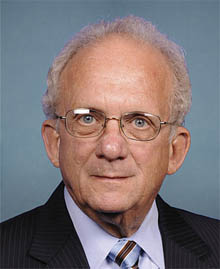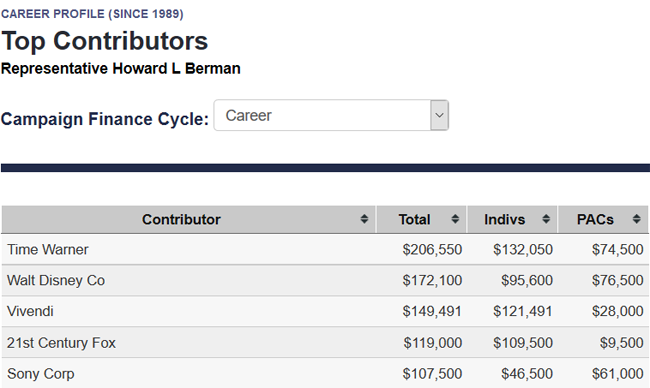Last week Hillary Clinton, Bernie Sanders and Democratic National Committee Chair Rep. Debbie Wasserman Schultz chose a panel of individuals to draft the party’s platform.
As previously reported, 15 were selected, with six chosen by Clinton, five chosen by Bernie Sanders and four chosen by Wasserman Schultz. While other publications will certainly pick over the bones of the rest of the committee, one in particular stands out as interesting to TF readers.
Howard L Berman is an attorney and former U.S. Representative. He’s employed at Covington & Burling as a lobbyist and represents the MPAA on matters including “Intellectual property issues in trade agreements, bilateral investment treaties, copyright, and related legislation.”
It will come as no surprise then that the major studios have been donors throughout Berman’s political career. As shown in the image below, the top five contributors are all major movie companies.
Born in 1941, Berman’s work with the film industry earned him the nickname “the congressman from Hollywood” and over the years he’s been at the root of some of the most heated debates over the protection of intellectual property.
In 2007 and as later confirmed by Wikileaks, Berman was one of the main proponents of ACTA, the Anti-Counterfeiting Trade Agreement.
Just five short years later Berman was at the heart of perhaps the biggest copyright controversy the world has ever seen when he became a co-sponsor of the Stop Online Piracy Act (SOPA).
“The theft of American Intellectual Property not only robs those in the creative chain of adequate compensation, but it also stunts potential for economic growth, cheats our communities out of good paying jobs, and threatens future American innovation,” Berman said in the run-up to SOPA.
While these kinds of soundbites are somewhat common, it’s interesting to note that Berman showed particular aggression towards Google during hearings focusing on SOPA. On November 16, 2011, Berman challenged the search giant over its indexing of The Pirate Bay.
Insisting that there “is no contradiction between intellectual property rights protection and enforcement ensuring freedom of expression on the Internet,” Berman said that Google’s refusal to delist the entire site was unacceptable.
“All right. Well, explain to me this one,” Berman demanded of Google policy counsel Katherine Oyama.
“The Pirate Bay is a notorious pirate site, a fact that its founders proudly proclaim in the name of the site itself. In fact, the site’s operators have been criminally convicted in Europe. And yet…..U.S.-Google continues to send U.S. consumers to the site by linking to the site in your search results. Why does Google refuse to de-index the site in your search results?” he said.
Oyama tried to answer, noting that Google invests tens of millions of dollars into the problem. “We have hundreds of people around the world that work on it,” she said. “When it comes to copyright….”
Berman didn’t allow her to finish, repeating his question about delisting the whole site, again and again. Before Berman’s time ran out, Oyama was interrupted several more times while trying to explain that the DMCA requires takedowns of specific links, not entire domains. Instead, Berman suggested that Oyama should “infuse herself” with the notion that Google wanted to stop “digital theft.”
“[T]he DMCA is not doing the job. That is so obvious,” he said. “[Y]ou cannot look at what is going on since the passage of the DMCA and say Congress got it just right. Maintain the status quo.”
These arguments continue today in the “takedown, staydown” debate surrounding the ongoing review of the DMCA, with Hollywood lining up on one side and Google being held responsible for the actions of others on the other. But simply complaining about the DMCA is a little moderate for Berman.
Almost one and a half decades ago in the wake of Napster and before the rise of BitTorrent, Berman had a dream of dealing with peer-to-peer file-sharing by force. In 2002 he proposed the Peer To Peer Piracy Prevention Act, which would have allowed copyright holders to take extraordinary technical measures against file-sharers in order to stop the unauthorized distribution of their content.
H.R.5211 sought to amend Federal copyright law to protect a copyright owner from liability in any criminal or civil action “for impairing, with appropriate technology, the unauthorized distribution, display, performance, or reproduction of his or her copyrighted work on a publicly accessible peer-to-peer file trading network.”
The bill didn’t deal in specifics, but “impairing” was widely believed to be a euphemism for DDoS and poisoning attacks on individual file-sharers in order to make sharing impossible from their computers.
At the time “shared-folder” type sharing apps were still popular so bombarding networks with fake and badly named files would also have been fair game, although distributing viruses and malware were not on the table. Eventually, however, the bill died.
Berman, on the other hand, appears to be very much alive and will be soon helping to draft the Democratic Party platform. On past experience his input might not be too difficult to spot.









